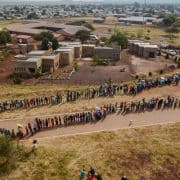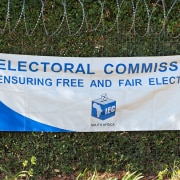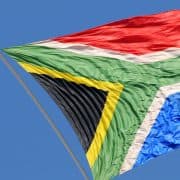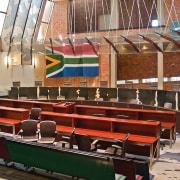|
Getting your Trinity Audio player ready...
|
Democracy [noun]
UK /dɪˈmɒk.rə.si/
The belief in freedom and equality between people, or a system of government based on this belief, in which power is either held by elected representatives or directly by the people themselves.
South Africa, like more than 60 other countries, goes to the polls in a couple of months in what is arguably the most potentially impactful general election since 1994.
Our governing system of constitutional democracy means that the South African Constitution is the supreme law of the land. “Law or conduct inconsistent with it is invalid, and the obligations imposed by it must be fulfilled,” the introduction to the Constitution states.
Nevertheless, enshrined in the Constitution are a host of human rights that are regularly – if not constantly – trampled by the very South African government that claims to respect them. Chapter 2, the Bill of Rights, concisely lays out these rights, which include the right to life; the right to have one’s dignity respected and protected; the right to bodily and psychological integrity; and the right to an environment that is not harmful to their health or wellbeing.
Despite the fact that these rights are provided for in law, it doesn’t help the dozens of people who died in Hammanskraal in May 2023 because an unlawful tender and failure to upgrade the Rooiwal wastewater treatment plant caused a cholera outbreak, nor does it comfort their families. It doesn’t comfort the hundreds of mental healthcare patients whose dignity was abhorrently abused in the Life Esidimeni scandal, and it won’t bring back the 141 who died. It doesn’t comfort the millions who live in undignified conditions without water, electricity, sewerage, or even a roof over their head. It certainly doesn’t comfort the women and children assaulted and murdered every day, or the whistle-blowers terrorised by those whose nefarious activities they expose.
And yet, “Everyone is equal before the law and has the right to equal protection and benefit of the law,” the Constitution proclaims.
Betrayal of the Constitution is a betrayal of democracy.
As Corruption Watch, we therefore urge South Africans to use their vote – their democratic power – with the utmost discretion at the voting stations in May. Think carefully about to whom you entrust your vote, because if you entrust it to the wrong people you essentially give it away for nothing.
Global decline in democracy
South Africa is not the only country grappling with a decline in democracy – far from it. A report released by the Stockholm-based International Institute for Democracy and Electoral Assistance (International IDEA) in November 2023, highlights the complex and unequal state of democracy around the world.
Titled The Global State of Democracy (GSoD) 2023: The New Checks and Balances, the report notes that: “Across every region of the world, democracy has continued to contract, with declines in at least one indicator of democratic performance in half of the countries covered in the Report. Measured in terms of the areas of improvement and decline within each country, 2022 was the sixth consecutive year in which more countries experienced net declines in democratic processes than net improvements. This six-year pattern of decline is the longest of this kind since our records began in 1975.”
The report presents the state of democracy under four overarching categories: Representation, Rights, Rule of Law, and Participation. The GSoD indices present estimated values for 28 sub-factors per country per year, assembled from 157 individual indicators devised by various scholars and organisations. Indicators cover topics such as Executive oversight, Freedom of Speech and Press, Harassment of Journalists, Equal Opportunity, and Women’s Political Rights. All indicators are scaled to fall between 0 and 1, with 0 representing the lowest achievement and 1 the highest.
The most notable declines were seen in Representation (Credible Elections and Effective Parliament, among others) and in Rule of Law (Judicial Independence, and Personal Integrity and Security, among others). These setbacks were seen in every single region of the world, the GSoD 2023 noted, encapsulated in events such as the spate of African coups d’état, or the collapse of representative institutions in Haiti.
In the latter category, however, there were improvements across all regions, in countries which had seen many years of stagnation because of corruption.
In terms of Rights, the report notes, the world marked the 75th anniversary of the Universal Declaration of Human Rights in December 2023, yet there is an overall pattern of decline in the GSoD’s measures of respect for human rights. Declines have become the norm.
The most encouraging category was Participation, where scores remained surprisingly high even in countries with a low level of democratic performance at an institutional level. While there were still more countries with declines in Participation than advances, the picture here was much less negative than in other areas of democratic performance.
The overall picture signifies “the most worrying political trend in the world today: ‘democratic backsliding’, the erosion of checks and balances and constitutional freedoms in nominally democratic societies”.
At best, says the GSoD 2023, democracy is stagnant, but there are a few hopeful signs to watch. “There were encouraging improvements in countries where the level of oppression has been constant for years.”
Another bright note involves the increasingly meaningful role of so-called countervailing institutions (CIs) in halting the erosion of democratic institutions and reacting to the entrenchment of authoritarian forces. These transcend the traditional understanding of ‘checks and balances’, says the report, and encompass “those governmental and non-governmental institutions, organisations and movements that check the aggrandisement of power and balance the distribution of power to ensure that decision makers regularly integrate popular priorities into policy.”
Such CIs include human rights organisations, electoral management bodies, civil society networks, popular movements, and investigative journalists. “All play an irreplaceable role in ensuring democracy continues to be of and by the people.”
The situation in Africa
Across the continent the quality of Representation has fallen, thanks to events including unconstitutional changes of government and chronic declines where authoritarian leaders and parties have sought to prolong their time in power.
“Yet, while African countries continue to perform below the global averages for many indicators, the continent has emerged as a bastion of strength in the category of Participation – even in countries where other indicators present a dire situation for democracy.”
Scores are presented per category, rather than an overall score. South Africa scored 0.65 (out of 1) for Representation, 0.62 for Rights, 0.54 for Rule of Law, and 0.67 for Participation.
The country’s weakest score, 0.54 for Rule of Law, puts it behind other African countries such as Botswana (0.59), Namibia (0.58), Cabo Verde (0.57), and Tanzania (0.56). It is worth noting that this is a minuscule improvement from the 0.53 seen in the previous GSoD.
African countries that experienced the greatest number of declines over the last five years (i.e. declines in more than five factors) are Benin, Burkina Faso, Chad, Guinea, Mauritius, and Tunisia. Conversely, there was only one country that experienced advances in more than five factors, and that is Ethiopia.
The key findings for Africa, according to the report, are as follows:
- There were diverse democratic trends across the continent, but the continuing wave of coups d’état, as well as civil conflict in Ethiopia and Sudan, highlights the challenges to democratic consolidation. The quality of Representation in many countries has been negatively affected by unconstitutional changes of government, the evasion of term limits for heads of state, and by declines in Credible Elections.
- Even so, countries noted for their recent progress (such as The Gambia and Zambia) remain on a positive course, particularly through improvements in election administration, participation, and the expansion of civic space.
- Participation is an area of regional strength. Nine African countries are in the top 50 in the world in levels of Participation. Recent experiences in Ghana, Kenya, Morocco, Mozambique, Nigeria, and Sierra Leone (among other countries) have shown that popular movements can play a vital role as a countervailing institution when other institutions have been unable to constrain governments. However, the frequency of violence associated with such protests suggests that this should be a countervailing institution of last resort.
- Formal CIs have a mixed record. Co-opted and weak legislatures have contrasted with judiciaries and fourth-branch institutions that have demonstrated they can be effective checks on executive power.
- The African Union and the Regional Economic Communities have an important role to play in establishing and upholding democratic norms in Africa. However, inadequate compliance by member states (including on matters as serious as reinstating a head of state, or making a swift transition back to civilian rule) has shown that there is no substitute for effective democratic institutions at the domestic level.








